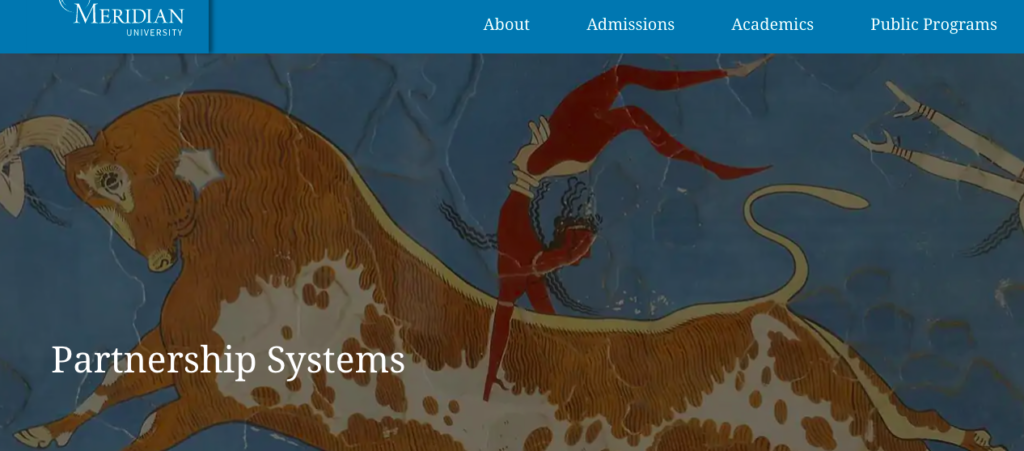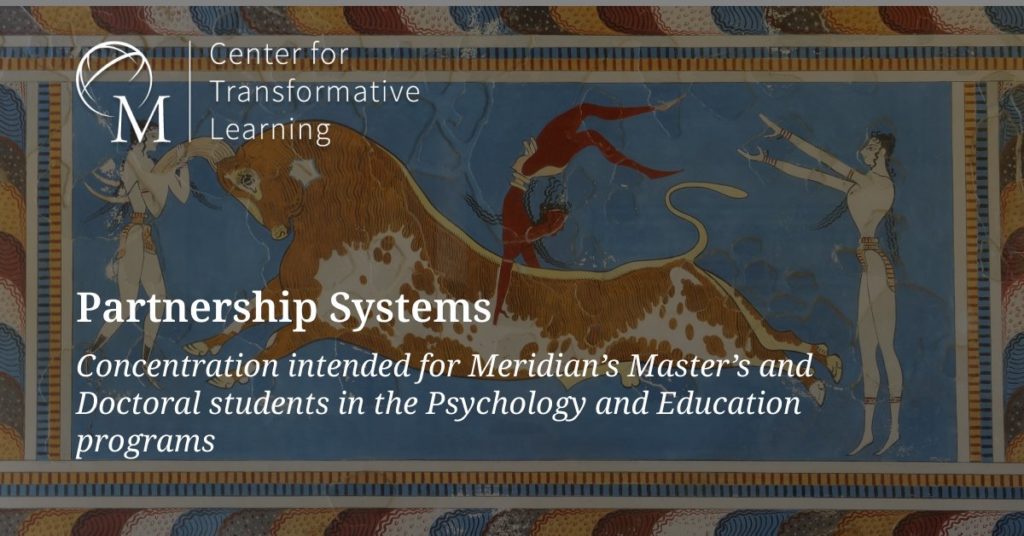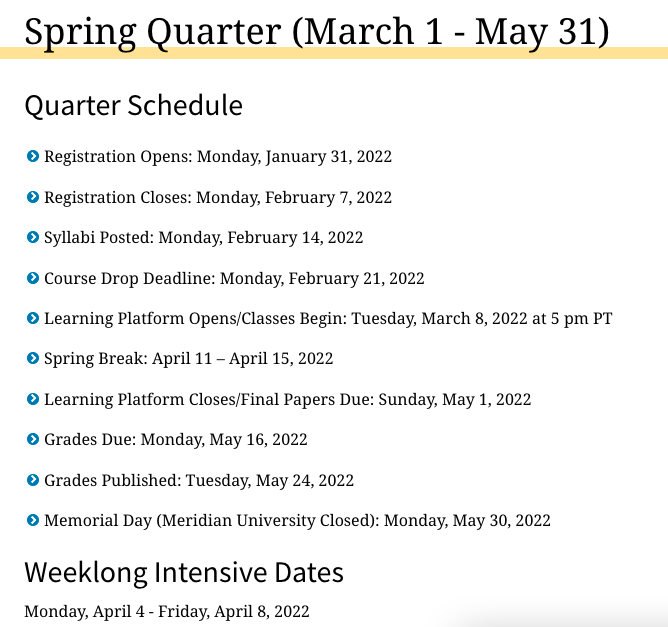Meridian University's new Partnership Systems concentration integrates the work of Riane Eisler and other prominent thinkers.
PhDs and Master's Degrees in Partnership Systems
The Partnership Systems concentration is intended for Master's and Doctoral students in the Psychology and Education programs who are pursuing PhDs and Master's Degrees and aspire to become Partnership Systems Practitioners in the context of their professional goals.
Eisler will co-lead the new Partnership Systems concentration at Meridian, with Aftab Omer, sociologist, psychologist, futurist, and the president of the university, and Melissa Schwartz, Chief Academic Officer at Meridian University, psychologist, and marriage and family therapist.
Meridian University Degrees for Partnership Practitioners
World-System and cultural crises are unfolding around the world in communities and societies at an intensifying rate. On a long journey of perhaps 200,000 years, humans have structured their collective lives within what could be understood as either Partnership Systems, or Domination Systems. Both types of systems can take less or more forms of complexity.
An understanding of partnership systems has been substantially articulated and affirmed by the work of Riane Eisler as well as the research and scholarship of others, for example: David Loye, Marija Gimbutas, Ruth Benedict, Douglas Fry, David Korten, Jean Baker Miller, Nancy Folbre, and Nell Noddings.
Partnership System Practitioners are needed at scale to respond to these cascading crises.
"Stripped to its essentials, the central human task is how to organize society to promote the survival of our species and the development of our unique potentials. A partnership society offers us a viable alternative."
—Riane Eisler, The Chalice and The Blade
Partnership Systems Practitioners facilitate the development of partnership capabilities within intimate systems, teams, organizations, communities, and societies. The Partnership Systems concentration is intended for Master's and Doctoral students in the Psychology and Education programs who aspire to be Partnership Systems Practitioners in the context of their professional goals.
Practices, methods, ideas, and topics engaged within this concentration’s courses, by way of example, include domination hierarchies & actualization hierarchies, affective neuroscience, relational & emotional development, collective trauma, gender, childhood development, economics, synergy, interdependence, mutuality, accountability, regenerative practice, cultural leadership, coalition building, and restorative justice.

Selected Concentration Courses
Meridian courses aligned with this concentration include:
- Consciousness and Partnership Capabilities
- Caring and the Spectrum of Partnership Systems
- Moral Codes and the Evolution of Partnership
- Theories of Cultural Transformation
- Spirituality and Cultures of Partnership
Quarter Schedule:
Spring Quarter classes run from March 1 2022 - May 31 2022.
- Registration Opens: Monday, January 31, 2022
- Registration Closes: Monday, February 7, 2022
"An essential tool for government leaders, politicians, economists, and everyone looking for ways to halt environmental destruction, eradicate poverty, stabilize population, and build a better future."
— Vigdis Finnbogadóttir, Former President of Iceland, on Riane Eisler's The Real Wealth of Nations
Academic Structure
Meridian’s academic structure gives students the flexibility to navigate the University’s curricular architecture in ways that match their passions, professional goals, and other life commitments.
The structure is designed to serve a diverse student body who live around the globe, have varied cultural and clinical visions for their careers, and are at different stages in their professional journey.
Students enroll in a degree program, can elect a concentration, and register for one or multiple courses each quarter. In addition to core courses for the specific degree program and anchor courses that represent the transformative learning intent of Meridian’s curriculum, students select elective courses that align with their Meridian concentration, background, and career path.
Learning Formats
Hybrid Format
Meridian’s hybrid learning format combines online courses with onsite weeklong residential intensives. The hybrid learning format is designed to enable students to pursue their graduate education at a flexible pace, combining asynchronous coursework via the University’s custom social learning platform, Pivot, live course video calls with faculty, synchronous student community engagement, and one-week residential intensives. By combining innovative online education methodologies with rich video calls and deep residential connections, the hybrid format enables students to contribute locally and perceive globally.
Each quarter, students take one or multiple seven-week online courses. This schedule provides students with time between quarters to rest, engage, and prepare. Additionally, students attend at least two weeklong onsite residential intensives per academic year. Intensives run Monday through Friday throughout the year, with residential intensives taking place at Meridian’s Bay Area Center and other globally distributed locations.
Online Format
In Meridian's online learning format, students can complete 100% of their coursework degree requirements online. Virtual intensives are also available for students who choose not to travel to residential intensives. Students can select intensive dates, locations, and formats based on their personal circumstances and professional aspirations.
Accreditation and Financial Aid
Meridian University is a degree-granting higher education institution accredited by the Senior Commission of the Western Association of Schools and Colleges (WASC). As an accreditor, WASC is recognized by the U.S. Department of Education. WASC is also an accreditor of the University of California, Berkeley, UCLA, and Stanford University.
Meridian is approved by the U.S. Department of Education for participation in the Federal Student Aid programs as well as by the U.S. Department of Veteran’s Affairs for the training of veterans and other eligible persons.
The University is approved by the U.S. Department of Homeland Security to provide form I-20 to eligible international students, enabling travel to and stay in the United States.
Meridian offers institutional financial aid to qualified international students.
Additional Program Structure Information
- Course availability varies by quarter and by program/degree. Students should seek clarification from their admissions advisor prior to enrolling regarding course and format criteria that are important to them personally or professionally.
- Generally, at least one intensive is held each quarter, though more than one may be held. Intensives are held onsite at Meridian’s Bay Area Center and other distributed locations, ae well as virtually (i.e., online over Zoom). Students are required to attend a certain number of intensives to complete their graduation requirements, depending on their specific degree program and attend at least two intensives per academic year until they have met the required number of intensives.
- Students may attend an intensive in more than two quarters each year (and therefore attend up to three or four intensives), space permitting. Students who have not yet attended two intensives in a given academic year are given registration priority.
- Students pursuing state licensure have additional specific course requirements and may need to complete additional credits beyond the published total credits required for the degree if they seek: 1) Both educational eligibility for licensure and a concentration that is other than the clinical concentration; 2) For PhD and PsyD students, educational eligibility for licensure other than that of Psychologist and/or; 3) Educational eligibility for multiple licenses.
- Meridian licensure preparatory curricula is designed for a specific set of state licenses. Students pursuing state licensure should keep in mind the specific licensure requirements for each state they may seek to practice within. Some state licensing boards require APA accreditation (American Psychological Association) which none of Meridian's Psychology degree programs have nor do faculty wish to seek, as this would affect the unique curriculum offered at Meridian. Note however that the University holds institutional accreditation from the WASC Senior College and University Commission which is a United States regional accreditor recognized by the US Department of Education.
- Part-time enrollment extends the length of the degree program. There are minimum and maximum credits required in each quarter to stay enrolled, and intensive attendance requires different levels of credit and course-count flexibility.
- Students can easily move between the two learning formats throughout their time as a student, based on availability. Residential and virtual intensive schedules are addressed in the Academic Calendar for each year.
- Students in the PhD in Psychology and PsyD in Clinical Psychology can earn the MA in Psychology degree during their enrollment if they complete the MA degree requirements on their way to earning a doctoral degree at Meridian.
See also: Riane Eisler’s path to Partnership—all on one page





Leave a Reply